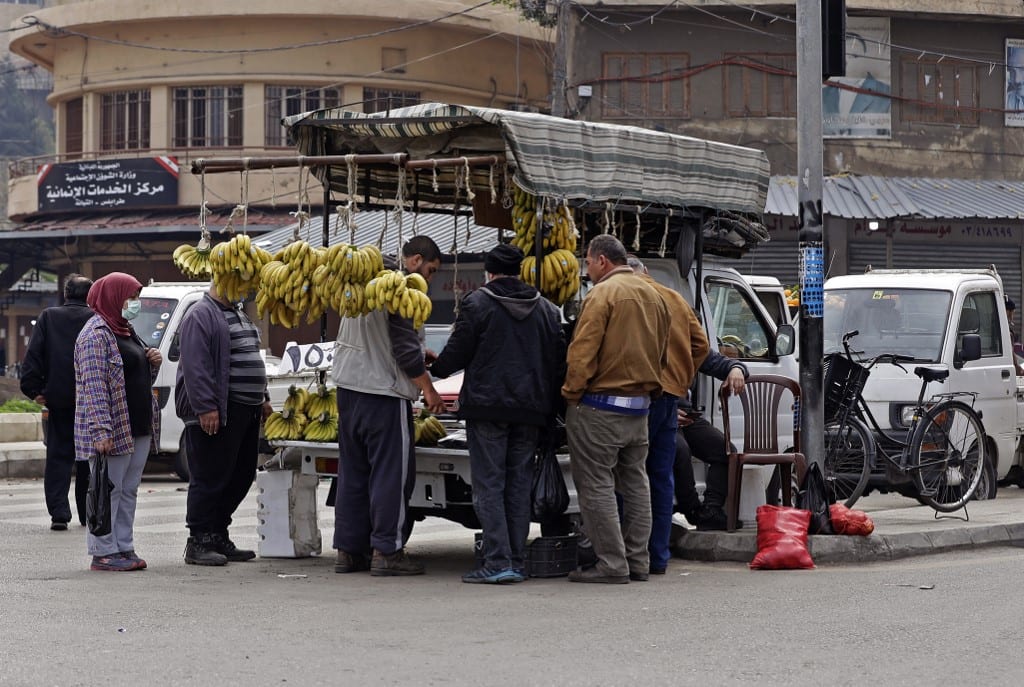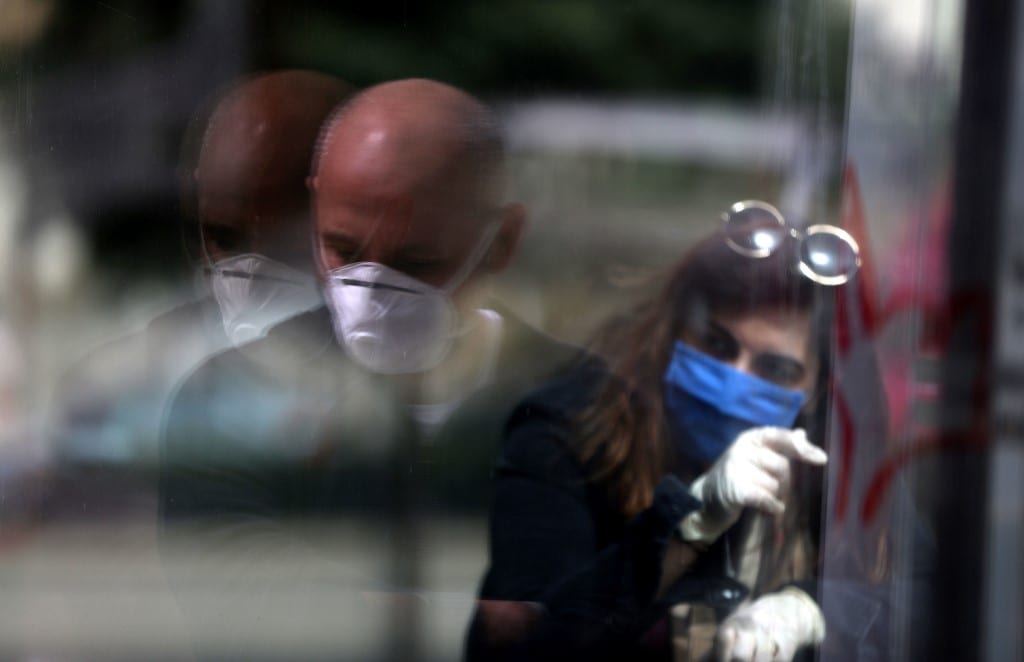“Less than a quarter of my salary, this was what I got at the end of March 2020, and the employer told me that from now on he won’t be able to pay my salary, and asked me to consider this period of self-quarantine an indefinite leave. When I tried to ask for more, so that I am able to pay for the room I’m renting, he did not listen and asked me to leave.” This is what Laila (a clothing store employee) explained to Daraj had happened to her. “At the end of the day, I could do nothing about it, I left crying, and I tried to ask the owner of the room I live in, to be patient and wait until I figure out a solution.”

Nermin had to close her children’s shoe store, and her husband, a securitization daily laborer, has been at home since the end of the summer, with real estate projects suspended in light of the economic situation deteriorating, leading to an increase in the US dollar rates. “I have 4 children, 2 of them are university students and the other two in school,” Nermin tells Daraj. “And now we are supposed to sit at home without getting any financial assistance, to be able to keep on feeding our families and pay our bills and installments.”
The stories of Laila and Nermin are not the most miserable in a country where about a third of the people fall under extreme poverty. The scenes of Tripoli and Halba protesting, even in the time of mass illness, explain that we are under incredibly devastating conditions, and in one of the worst countries in the world. The quarantine has now come to make matters worse, so whoever was able to provide for their basic needs before will end up impoverished and hungry, in light of failures to take measures that provide people with a decent life in light of the isolation, which may extend for months.
Before the ‘Coronavirus’ crisis, the World Bank had detailed the main assumptions to emulate the impact of the crisis ahead in 2020, and predicted that the nominal GDP per capita growth would be about 17.7%. The inflation rate is likely to be around 22.4%, meaning families’ will be dropping their consumption rates by 4.7%. That is why it has become almost certain that the impact of the crisis on poverty and extreme poverty will be catastrophic. Moreover, the poverty line will reach 41%, in Lebanon through 2020 if the situation stays the same, and the proportion of people living in extreme poverty will increase to reach 20%. It should be noted that this percentage rose from 10% in 2012 to 13.7% in 2019.
Spending and Masked Spending?
It’s not surprising that many companies have notified their employees that their salaries will be cut or in the best case scenario deducted, until conditions improve and things return back to normal.
On a phone call with the Minister of Labour, she confirmed to Daraj that ‘she is doing her best to protect workers and employees and to secure their rights. Moreover, she is trying to meet with those in charge of the private sector in a bid to limit abuses against employees.’ In reality there are a mere 36 inspectors employed at the Ministry of Labour tasked with inspecting thousands of enterprises ranging between small, medium and large. This makes it close to impossible to manage what’s happening or to investigate what blackmail and threats workers and employees are facing regarding their sources of income.
The Ministry continuously stressed on the circular issued by the Banque du Liban which provides business owners with comfortable, interest-free loans to help them pay the employees’ dues. However, most of these business owners will not choose to rope themselves into a new pile of debts, which they may not be able to repay, even if the interest rate is zero percent. Even if a large institution did manage to get a loan, we will never be able to tell if it’ll be used to pay the workers’ salaries in the first place.


The Last Days of the Middle Class
On the other hand, the problem among the owners of small and medium-sized enterprises, or owners of some liberal professions, can be regarded in other words as a large sector of the middle class that is no longer able to manage their affairs. Small and medium businesses (less than 50 employees) are threatened with bankruptcy and closure, in light of everything they suffered through in the recent period.
When these businesses collapse, and they are definitely on their way, this means the country’s economic collapse is imminent. This is while the state is being replaced by parties that are distributing food rations to the people, whereby each party provides its supporters with humiliating boxes of rice and “Picon” (cheese), in addition to other food and drink items. Throughout all of this the Lebanese citizen finds his existence threatened due to not being able to fulfill his obligations, while hiding from the ‘Coronavirus’ at home. Will he pay his bills? His bonds? His rent? The installments of his furniture and car? Will they pile up on his shoulders if he fails to pay?
But truth be told, the banks, it seems, are no longer in the mood to tolerate the protests in front of their gates. Therefore, Banque du Liban is offering people some sedatives so that they may sleep while some miracle takes place, or until the rest of the theft of their savings and lives is complete.
In Lebanon, there are about 100,000 companies, 95% of which are small and medium-sized companies. The latter is responsible for employing half of the Lebanese workforce, which in normal conditions amounts to 750,000 workers; thus between 400,000 to 500,000 are working in small and medium-sized enterprises. In that context, economist Professor Jassim Ajaqa explains to Daraj that, “the fate of these institutions is gloomy, as most of them do not have the financial capabilities to absorb the consecutive shocks resulting from the economic and financial crises, in addition to the Coronavirus crisis.Most of these companies will resort to dismissing their employees in the current circumstances, and those employees will be the main victims, while the whole system is now in crisis, as the Lebanese government announces that it has defaulted on its Eurobond debts, and thus, no longer introducing dollars into the country.”
“The economic and financial situation is extremely difficult,” he added. “The state has lost its sources of revenue, economic activity has suspended due to the coronavirus outbreak, in addition to the defaulting on the payment of the 90 billion USD in Eurobonds. There is political confusion in the country, and if the coronavirus crisis persists, we are heading towards a social crisis, due to the lack of income. The scene is bleak, we are at a dangerous phase; Unfortunately, we cannot emerge from this tunnel without the help of the International Monetary Fund.”
Amidst this dire situation and the terrors of hunger and disease, our Minister of Information, Manal Abdul-Samad, came out after the ministerial meeting to reprimand the citizens for their disregard of the Coronavirus, and for not committing to the home quarantine rules, threatening the poor and needy with imposing even tougher measures, all while they haven’t been offered any means of survival while they wait for this epidemic, and the accompanying economic crises which is not any less dangerous than the virus, to end.
The World Bank’s regional director, Saroj Kumar, recently warned of “the possibility that the poverty rate in Lebanon will rise to 50 percent if the economic situation worsens,” which, of course, it has, portending a further decline for the middle class, and an increase in the poverty rates of the poor.
In November of 2019, Chairman of the Beirut Merchants Association, Nicolas Chammas, warned that “50% of businesses and companies will not be able to persist and last up to 6 months,” stressing that with business activity declining by 80%,“ they have no choice but to choose between paying taxes to the state or paying their suppliers, paying bank interests, or paying employee salaries. ”
Chammas’s words came before the virus invaded our lives, when the dollar was still hanging at the edge of 2000 Lebanese liras. Today, the dollar is about to surpass 3000 liras, a catastrophe at large, as the bank of Lebanon tries to appease the people with generalizations that appear nice, but that will not solve the problem. This adds to the ambiguity about the fate of people’s looted savings, but with a more sophisticated tactic; they inform us happily about the creation of a platform or another Foreign Exchange market which includes the Banque du Liban and class ‘A’ currency exchange offices, like someone beating around the bush before revealing the ugly truth. But truth be told, the banks, it seems, are no longer in the mood to tolerate the protests in front of their gates. Therefore, Banque du Liban is offering people some sedatives so that they may sleep while some miracle takes place, or until the rest of the theft of their savings and lives is complete.






